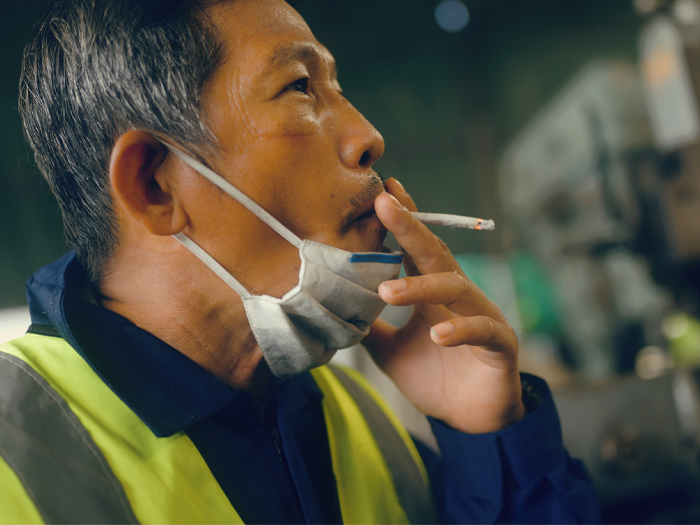View From the Bench
Workers’ Comp Docket
Injured Worker Not Entitled to Prosthesis of Choice
Whedbee v. North Dakota Workforce Safety and Insurance Fund,No. 20130391 (N.D. 04/29/14)
Ruling: The North Dakota Supreme Court held that the Workforce Safety and Insurance Fund properly awarded a specialist a body-powered prosthetic.
What it means: In North Dakota, the Workforce Safety and Insurance Fund is not required to provide a worker’s preferred medical device. It should consider each device’s durability, cost, and impact on the worker’s injuries.
Summary: A safety specialist for Black Hawk Energy Services was injured in an oil rig explosion. His left arm was amputated below the elbow. The Workforce Safety and Insurance Fund accepted liability for his injuries. The specialist’s treating physician recommended that he receive a myoelectric prosthesis. An independent medical examiner recommended a body-powered prosthesis. WSI denied the myoelectric prosthesis. WSI’s binding dispute resolution review committee agreed that the myoelectric prosthesis was not the most cost-effective option and approved the body-powered prosthesis. The specialist appealed. The North Dakota Supreme Court held that the WSI properly awarded the body-powered prosthetic.
The court explained that a managed care program should “effect the best medical solution for an injured employee in a cost-effective manner.” WSI determined that the myoelectric prosthesis was more elaborate than what the specialist needed for his work activities. Also, the myoelectric device was heavier than the body-powered device, raising concern over how the extra weight would effect his rehabilitation. The myoelectric device’s cost was also a concern because it would need a replacement every five to eight years and was susceptible to excessive moisture, dust, and potential breakage.
The court explained that WSI was not required to provide the specialist’s preferred device. WSI was not unreasonable in concluding that the body-powered prosthesis was the best medical solution in a cost-effective manner.
The court also rejected the specialist’s argument that his due process rights were violated. He did not have a protectable property interest in receiving one device over another, and WSI was not required to provide a “trial-type procedure” for managed care decisions. Also, the specialist did not show that the independent medical examination location in another state prejudiced him.
A dissenting judge opined that substantial evidence supported a finding that the myoelectric prosthesis was reasonably necessary to restore the specialist as far as practicable to his physical condition before the work-related injury. The judge said that WSI considered only the needs of the specialist’s job and not his other activities of daily living.
Heart Attack During Immigration Raid Not Compensable
Paredones v. Wrenn Brothers,No. COA13-910 (N.C. Ct. App. 05/06/14)
Ruling: The North Carolina Court of Appeals held that an undocumented worker’s children were not entitled to death benefits for his fatal heart attack.
What it means: In North Carolina, a worker’s death while attempting to evade a raid by immigration officials did not arise out of his employment when he was equally exposed to the risks associated with being an undocumented immigrant outside his employment.
Summary: A worker used falsified documentation to obtain employment for Wrenn Brothers. The worker was working when a coworker indicated that the plant was about to be raided by the Immigration and Naturalization Service. The worker and others attempted to run away, but after 100 yards, the worker collapsed and died. An autopsy determined that the worker suffered a heart attack. The worker’s children sought workers’ compensation death benefits. The North Carolina Court of Appeals denied death benefits, finding that the worker’s death did not arise out of his employment.
The worker’s children asserted that Wrenn Brothers was subjected to an increased risk of an immigration raid because it had Hispanic employees and other plants in the area had been raided by INS. The employer’s secretary said there had been no immigration raids in the area where the plant was located. The court found no direct evidence that the racial makeup of Wrenn Brothers’ employees increased the risk of an immigration raid. No evidence showed that the Hispanic workers were not legal workers or that Wrenn Brothers sought to hire illegal workers. There was also no evidence that Wrenn Brothers knew that the worker used falsified documents in order to obtain employment.
The court found that the worker died while fleeing from an apparent immigration raid and that there was no evidence of an increased risk of an immigration raid as part of his employment. The worker’s death was not caused by a risk that was inherent or incidental to his employment or a risk to which he would have been equally exposed outside his employment.
Traveling Employee Gets Down on the Dance Floor, Gets Comp
Gravette v. Visual Aids Electronics, et al.,No. 291, September Term, 2013 (Md. Ct. Spec. App. 04/29/14)
Ruling: The Maryland Court of Special Appeals held that a traveling technician was entitled to benefits for his injury that occurred while engaging in a recreational activity.
What it means: In Maryland, an injury to a traveling employee is compensable if it occurred as a result of an activity reasonably incidental to the travel that the employer required.
Summary: An audio visual technician for Visual Aids Electronics, who was a resident of Idaho, traveled to Maryland to provide services for a customer at a hotel. The employer paid for the technician’s travel expenses and for the cost of his hotel room. The technician, while off-duty, entered into a nightclub in the hotel. He was dancing when he slipped on some liquid on the floor and fell, injuring his pelvis. There was no indication that he was intoxicated at the time of his injury. The technician sought workers’ compensation benefits. The employer asserted that his injury did not arise out of and in the course of his employment. The Maryland Court of Special Appeals held that the technician’s injury was compensable.
In considering cases from other states, the court concluded that a traveling employee who is engaged in reasonable and foreseeable recreational activities when injured is entitled to workers’ compensation benefits because the recreational activities are “reasonably incident to travel.” The court found that the employer had at least constructive notice that the technician would make use of the entire facility at the hotel. The court found that the activity the technician was engaged in at the time of his injury was reasonable in that it was not dangerous or out of the ordinary. Also, it was foreseeable because the accident occurred on premises where the technician could be expected to use and not far removed from his actual work site.
The employer asserted that the technician’s dancing at the nightclub was not a necessary activity that was incidental to travel. However, the court found that “necessity was not the test.” If it was the applicable test, “it would be difficult to envision any case allowing a traveling employee to recover if engaged in recreational activities when injured.”
Methadone Overdose Not Causally Related to Work Injury
Loar v. Cooper Tire & Rubber Co. et al.,No. CV-13-1128 (Ark. Ct. App. 04/23/14)
Ruling: The Arkansas Court of Appeals held that a worker’s widow was not entitled to death benefits for his death due to a Methadone overdose.
What it means: In Arkansas, death benefits will not be warranted if a worker’s death was the result of conduct that was unreasonable and an independent intervening cause not related to the work.
Summary: A worker for Cooper Tire & Rubber Co. sustained a work-related injury. The worker had been addicted to opioid medication prescribed for back pain for one year before the injury. Four years after the injury, the worker consumed on average 4.7 Oxycontin pills per day when he was prescribed three pills per day. The worker obtained a Methadone prescription for six pills per day to treat him for withdrawal from opiates. In the four days after he obtained the prescription, the worker consumed 41 pills, which was 17 pills in excess of the number he should have taken. The worker’s wife requested that he stop taking the Methadone and see a doctor, but he continued to use the Methadone. The worker died from a Methadone overdose four days after he obtained the prescription. His wife sought death benefits. The Arkansas Court of Appeals held that she was not entitled to benefits.
The court concluded that the worker’s overdose and death was unreasonable and an independent intervening cause not related to the work injury. The court found that the worker had a proclivity to drug addiction, had been filling Oxycontin prescriptions from two doctors, and went to another unapproved doctor for Methadone.
The court also pointed out that the worker was able to coach football and travel for football equipment shortly before his death, supporting that his overdose was not in response to uncontrolled pain but was the result of his drug addiction. Evidence that the worker was “plainly intoxicated” shortly before his death to the degree that his wife hid his medications and threatened to have him committed also supported this finding.
Prior Drug Use Doesn’t Undermine Claim
Young v. Great Bend Cooperative Association,No. 110,025 (Kan. Ct. App. 04/18/14)
Ruling: The Kansas Court of Appeals held that an operator was entitled to benefits for her asthma.
What it means: In Kansas, the impairment defense does not apply when the worker was not impaired at the time of the injury even if she had a previous history of drug use.
Summary: A grain elevator operator for Great Bend Cooperative Association was exposed to grain dust. She had no prior breathing or upper respiratory problems but had smoked half a pack of cigarettes per day for two years. She also regularly smoked crack cocaine four years before working as an operator. The operator developed breathing difficulties and stopped smoking. A physician concluded that she had adult-onset asthma. The physician attributed the cause of the operator’s asthma equally to her history of smoking cigarettes and crack cocaine and her work-related exposure to dust. The operator sought workers’ compensation benefits. Great Bend raised the impairment defense, asserting that she was not entitled to benefits because of her history of smoking tobacco and crack cocaine. The Kansas Court of Appeals held that the operator was entitled to benefits.
The court explained that the impairment defense applies if the employer shows that the worker was impaired at the time of the injury and the impairment contributed to the worker’s injury or disability. In this case, the conclusive presumption of impairment did not apply to the operator because no evidence showed blood levels of any drug in her system at the time of the accident. Without evidence of contemporaneous impairment, the defense did not apply to the claim.
The court found no language in the statute to conclude that if some time in the past the operator’s blood test levels exceeded the statutory limits for cocaine, the legislature intended a presumption of impairment to apply and bar recovery of benefits. The court rejected Great Bend’s argument that the operator’s prior drug use contributed to the injury.
Widow Connects Suicide to Work-Related Injuries
Chaput’s Case,No. 12-P-1932 (Mass. App. Ct. 04/10/14)
Ruling: The Massachusetts Appeals Court held that a taper’s widow was entitled to benefits for his work-related injuries and suicide.
What it means: In Massachusetts, a worker’s suicide is compensable if it is causally connected to the unsoundness of mind resulting from the work-related injury.
Summary: A drywall taper for New England Finish Systems injured his right dominant hand in a work-related accident. The taper initially received workers’ compensation benefits, but the insurer later terminated benefits. Subsequently, the taper committed suicide. After the taper’s death, an administrative judge found that the insurer improperly terminated benefits. The taper’s widow sought dependency benefits. The Massachusetts Appeals Court held that the widow was entitled to benefits.
The court concluded that the taper’s suicide was committed while suffering from and as a result of his work-related depression. The court also found a direct causal relationship between the industrial injuries and the taper’s death. The widow’s medical expert opined that the taper was depressed from his work-related right hand pain and his severe limitations in using his hand. The expert also pointed out that the taper experienced financial pressure when the insurer ceased his benefits.
The court also found that lay testimony strengthened the medical opinion on causation. The widow explained that she “saw a change” in the taper after the accident. She said his wages were their only income, and after the insurer ended benefits, his depression worsened.
The court also found that the widow was entitled to recover attorney’s fees and costs for her appeal.
Intoxication Not to Blame for Fall Through Rotting Roof
Gideon v. Yost Properties,No. 110,232 (Kan. Ct. App. 04/11/14, unpublished)
Ruling: In an unpublished decision, the Kansas Court of Appeals held that a worker was entitled to benefits for his fall through a roof because his employer failed to prove that his intoxication contributed to the accident.
What it means: In Kansas, a worker’s intoxication will bar his claim for benefits if the intoxication contributed to his accident.
Summary: A worker for Yost Properties was directed to repair the roof of one of its buildings. He was tearing off the deteriorated roll roofing and shingles when a swarm of ants started crawling on him. When he attempted to brush the ants away, he heard a cracking noise. The roof shifted under the worker’s feet, gave way, and knocked him off balance, causing him to fall through the roof. He sustained injuries to his back and arm.
The worker admitted that he had been drinking beer earlier in the day. The worker’s urinalysis was positive for cocaine and marijuana metabolites. A blood test revealed a blood alcohol level of 0.095. The worker sought benefits. Yost asserted the intoxication defense.
The Kansas Court of Appeals held that the worker was entitled to benefits.
The court found that the worker was impaired at the time of the accident because his blood alcohol level taken after the accident was more than double the statutory amount required for a conclusive presumption of impairment. However, Yost did not show that the worker’s impairment contributed to his injuries.
The court found no evidence of any lack of judgment by the worker while he was on the roof. The court said his drinking could have affected his balance, but he did not sustain his injuries from falling down on the roof. His fall through the rotted roof onto the pavement caused his injuries.
Yost’s physician conceded that a sober person could have fallen through the roof if he stepped on a bad spot without realizing it.
Climb Up Grassy Hill Foils Benefit Claim
Neal v. State of Illinois/East Moline Correctional Facility,22 ILWCLB 45 (Ill. W.C. Comm. 2014)
Ruling: The Illinois Workers’ Compensation Commission denied benefits to a nurse for injuries sustained while climbing a grassy hill to get to her workplace.
What it means: In Illinois, when an employer does not control what pathway a worker takes to get to work, it will not be responsible for benefits when the worker voluntarily chooses a path that exposed her to a danger separate from her employment responsibilities.
Summary: A nurse at a correctional facility slipped and injured her back while walking up a damp grassy hill leading from the parking lot to the employer’s main building. The nurse testified that she could have walked on a grassy foot path or along the main road leading into the facility. The nurse explained that the grassy foot path “seemed easier and safer” than walking alongside the road. The parking at the top of the hill was designated for wardens, doctors, administration, and the general public. The parking at the bottom of the hill was for employees and the general public. The commission denied benefits to the nurse, finding that her injuries did not arise out of and in the course of her employment.
The commission found that the employer could control where the nurse parked, but it could not control what pathway she took to get to work. The nurse’s voluntary decision to take the grassy hill path exposed her to a danger entirely separate from her employment responsibilities.
The commission also pointed out that because the general public could also park at the bottom of the hill, the nurse was exposed to the same pathways as the general public to get to the employer’s main building. Therefore, the nurse’s injury did not arise from a risk to which she was exposed to a greater degree than the general public.










